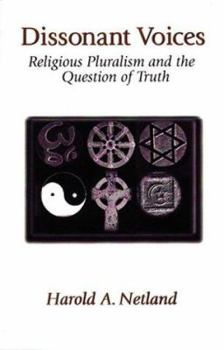Dissonant Voices: Religious Pluralism & the Question of Truth
Select Format
Select Condition 
Book Overview
No Synopsis Available.
Format:Paperback
Language:English
ISBN:1573830828
ISBN13:9781573830829
Release Date:April 1999
Publisher:Regent College Publishing
Length:336 Pages
Weight:0.90 lbs.
Dimensions:0.8" x 6.2" x 8.6"
Related Subjects
Christian Books & Bibles Education & Reference Religion Religion & Spirituality TheologyCustomer Reviews
2 ratings
Well-reasoned and incisive critique of religious pluralism
Published by Thriftbooks.com User , 22 years ago
After reading several different popular level works that deal with the relation of Christianity to other religions, I finally found a good book. This book gave substantive descriptions of different religions and their various claims avoiding charges of caricature.To define the terms:Christian exclusivism: exclusivism maintains that the central claims of Christianity are true, and that where the claims of Christianity conflict with those of other religions, the latter are to be rejected as false. (page 9)Religious pluralism: God is said to be actively revealing himself in all religious traditions. (page 10) All religions are in their own way complex historically and culturally conditioned human responses to the same divine reality. (page 26)This book discusses religious pluralism and if it is rational and so on. One of the book's great strengths is the recognition that the religions of the world say basically different or contradictory things about three vital religious topics: the nature of the religious ultimate (e.g. Allah, The Holy Trinity, Krishna, Nirvana, Brahman etc..), the nature of the human predicament (e.g. rebellion against a holy and righteous God, ignorance, being locked into a continuous state of reincarnation). To summarize Netland shows that regarding all religions as the same or saying the same thing requires significant distortion of or radical alternation of the defining beliefs (the beliefs which are essential to any religion being true). The other approach the pluralists use is to argue that these religions do not intend to make ontological claims (or claims about reality) but rather they are mythical, meaningful constructs. At best, this distorts what Buddhists, Christians, Jews, Muslims and others believe.Two chapters in particular were outstanding in the book: (4) Religion and Truth (5) Evaluation Religious TraditionsIn (4), Netland looks at the views of liberal contemporary theologians and how they view religious truth. He summarizes the views of many theologians in these two propositions: (1) Personal truth can legitimately be applied to religion whereas propositional truth cannot. (2) Both personal truth and propositional truth can be applied to religion, but personal truth is somehow more basic and fundamental than propositional truth. (page 129)Netland shows the inadequacy of both of these views. Further on in the same chapter, Netland shows the problems with the ineffable thesis, which asserts that the religious truth is inexpressible or put another way, "Beliefs and doctrines are just inadequate pointers toward what cannot be articulated." (page 133). A modified version of the ineffable thesis is the via negativa which asserts that only negative statements can be made about God (e.g. God is not physical. God is not evil. God is not of limited intelligence. etc). However, to use this method implies that one has positive knowledge about God by which one knows that the negative statements are indeed true. Then there
Excellent intro to the questions of religious pluralism
Published by Thriftbooks.com User , 24 years ago
I read the original Eerdman's edition of this book from 1991, and have used it several times in classes on Religious Pluralism at Denver Seminary. It is a well-written, informed, and philosophical treatment. It nicely summarizes the world views of several major religions without caricature. Prof. Netland's critique of John Hick's theories are particularly penetrating. I'm very happy to see this book back in print. It makes an excellent textbook in philosophy and religious studies courses.Be sure to read his follow-up work as well, Encountering Religious Pluralism (InterVarsity, 2001), which is similarly superb.Douglas Groothuis, Ph.D., Professor of Philosophy Denver Seminary




